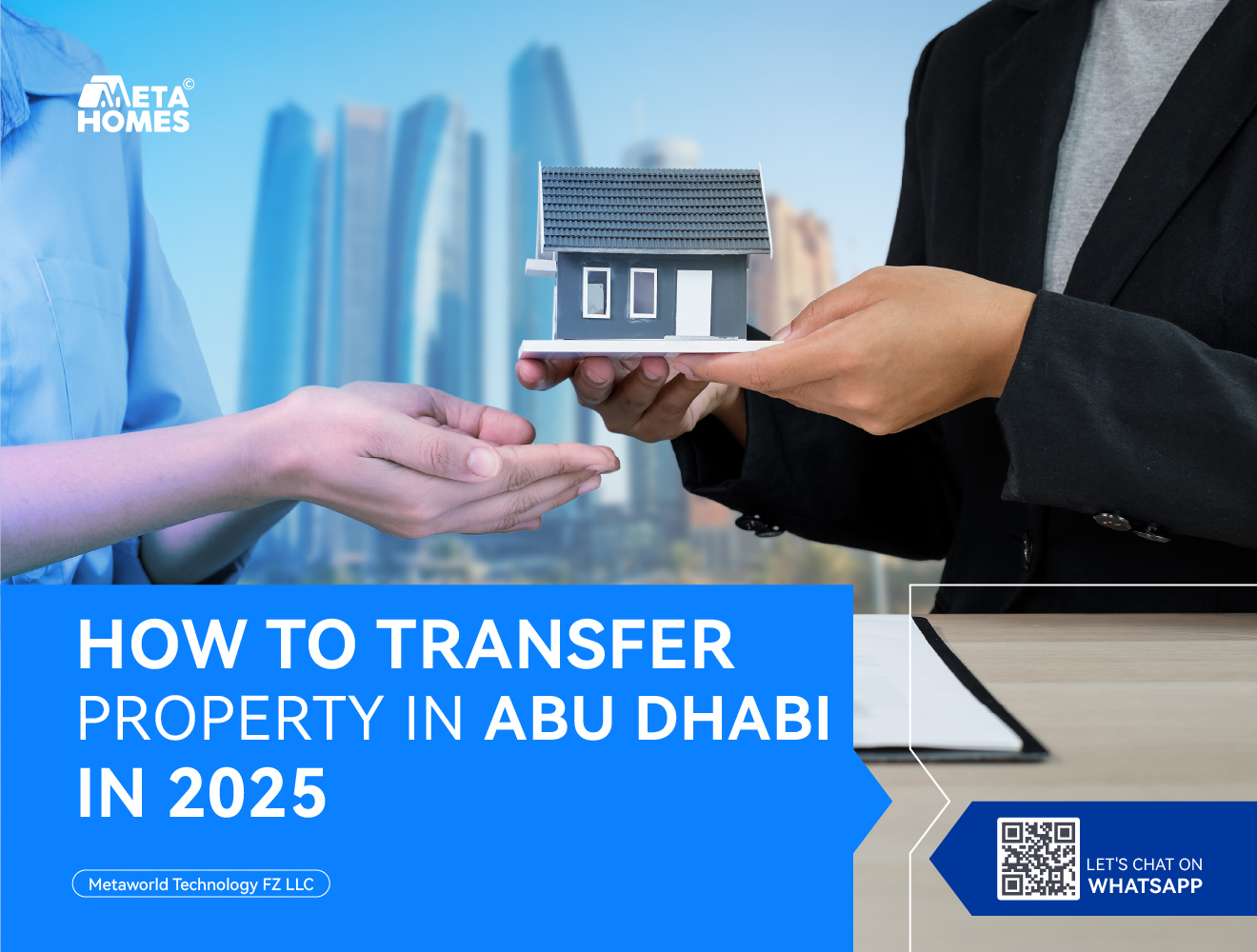
If you’re buying property in Abu Dhabi or selling one, understanding the Abu Dhabi property transfer process is crucial.
Whether you’re a first-time buyer, an investor, or an expat, transferring real estate in the UAE involves legal steps, fees, and documentation.
It helps to know how property transfer works in Abu Dhabi compared to the rest of the UAE.
Each emirate has its own regulator—Dubai has the Dubai Land Department (DLD), while Abu Dhabi property transfers are handled by the Department of Municipalities and Transport (DMT).
Regardless of location, any real estate transfer in the UAE shares common pillars: a signed Sale and Purchase Agreement (SPA), government registration, payment of fees, and issuance of a new title deed.
In Abu Dhabi, the DMT ensures transactions comply with local laws and that buyers get clear ownership.
Note that most often, when people talk about buying property in Abu Dhabi, they sometimes mix up initial purchases (especially off-plan) with the formal transfer of ownership.
Buying whether you contract directly off-plan or through a resale means you agree a price with the seller (or developer) and sign an SPA.
The next step is to transfer property: take that signed contract, register it with DMT, pay transfer fees, and secure your new title deed.
Think of buying as agreeing to a deal and transferring as making it official on Abu Dhabi’s books.
Pre-Transfer Checklist: Documents & Due Diligence
Before you visit the DMT or schedule an appointment on the TAMM portal, gather and prepare:
- Original Sale and Purchase Agreement (SPA), signed by both parties.
- Seller’s Title Deed or proof of ownership (if resale).
- Emirates IDs and valid passports (with UAE visa stamps) for the buyer and seller.
- Power of Attorney (PoA), if someone represents the buyer or seller.
- No Objection Certificate (NOC) from the developer (for freehold and off-plan projects).
- Bank clearance letters, if the property has an outstanding mortgage.
- Signed a commission agreement if a broker is involved
Double-check names, passport numbers, and property details across all documents. Any mismatch can delay your Abu Dhabi property transfer by days or weeks.
Drafting & Reviewing the Sale and Purchase Agreement
If you haven’t yet signed an SPA, work with your agent or lawyer to draft a clear, binding contract. Key points to cover:
- Property description: precise unit number, building name, plot or villa number.
- Purchase price: total amount, currency (AED), and payment schedule.
- Payment plan: deposit amount, instalment dates, and final settlement date.
- Completion date: expected handover and title transfer deadline.
- Penalty clauses: fees for developer or seller delays.
Before you commit, have a qualified legal advisor review the SPA to ensure it protects your interests. A solid SPA is the foundation of a smooth property transfer process.
Booking Your DMT Appointment via TAMM
Abu Dhabi’s government services are streamlined on the TAMM portal, which you or your agent can access at tamm.abudhabi. Here’s how to schedule:
1. Log in with your UAE Pass or create an account.
2. Select Property & Real Estate > Property Transfer.
3. Book an appointment at your preferred DMT service centre.
4. Pay any pre-registration fees online (if required).
5. Upload scanned documents: SPA, IDs, NOC, mortgage clearance, etc.
Once confirmed, you’ll receive an appointment slip. Bring both originals and copies of all documents on the day.
On-Site at the DMT Service Centre
On your appointment day:
- Arrive 10–15 minutes early to allow for security checks.
- Please present your appointment slip and Emirates IDs at the reception desk.
- The clerk reviews uploaded documents, verifies the originals, and inputs the information into the system.
- You and the seller (or your representatives with PoAs) will sign the transfer application form.
The DMT officer then calculates transfer fees, issues an electronic payment request, and lets you know the total amount due.
Paying Fees & Stamping the Transfer
Transfer fees in Abu Dhabi are typically 2.5% of the property’s market value, although this can vary for special zones or off-plan incentives. Here’s the breakdown:
- Transfer fee: 2.5% of purchase price or RICS-appraised value.
- NOC fees: charged by developers (varies, often AED 500–AED 1,500).
- Admin or registration fees: flat AED 500–AED 1,000.
You’ll pay via POS terminal at the DMT centre or through an online link. Keep the payment receipt, as the DMT officer will need it to stamp and finalise your transfer.
Receiving the New Title Deed
After payment:
1. The DMT processes your application, usually the same day or within 1–2 working days.
2. You’ll be issued a new electronic title deed, accessible via the TAMM portal or DMT’s Esajil e-service.
3. Print a certified copy or request a hard copy from the service centre.
This new title deed officially records you (or your company) as the legal owner of the property. Congratulations—you’ve completed the property transfer in Abu Dhabi!
Post-Transfer Steps: Utilities, Community & Records
With your title deed in hand, wrap up these remaining tasks:
- In Abu Dhabi, the equivalent of Dubai’s DEWA is ADDC (Abu Dhabi Distribution Company) for electricity and water services. To set up or update your account, simply provide your new title deed.
- Municipality accounts: Ensure waste disposal and housing fees reflect the new owner.
- Home insurance: Notify your insurer of the ownership change.
- Community management: Pay any outstanding service charges and update resident records.
Updating these services ensures you avoid late fees and enjoy uninterrupted utilities.
Common Pitfalls & How to Avoid Them
There are a few common pitfalls that you need to avoid while transferring property ownership in Abu Dhabi:
1. Mismatched Documents
One typo in a passport number or unit number can stall your transfer. Always cross-check!
2. Missing NOC
Developers in some freehold areas and off-plan zones require an NOC. Don’t skip this document.
3. Unpaid Service Charges
Sellers with outstanding community fees can block your transfer. Request a clearance letter before signing.
4. Ignoring Escrow Requirements
For off-plan projects, confirm your payments went into the RERA-approved escrow account. Direct payments to a developer’s corporate account are risky.
5. Skipping Legal Review
The SPA and PoAs are legal documents. A quick lawyer check can prevent costly disputes later.
Timeline & Cost Summary
Step Timeframe Approx. Cost
Draft/Sign SPA 1–2 weeks N/A (agent/lawyer fees)
Book Appointment via TAMM Same day AED 100–200 (if online fee)
DMT Appointment & Document Check 1–2 hours AED 100 (admin)
Fee Payment & Stamping Same day 2.5% transfer fee + NOC fees
Title Deed Issuance 1–2 working days Included in transfer fee
Utility & Insurance Updates 1 week Varies per service
Budget 4–6 weeks from SPA signing to final handover of your new title deed, assuming no complications.
Can non-UAE residents transfer property in Abu Dhabi?
Yes. Expats can buy and transfer freehold property in designated areas. Just provide a valid passport and UAE visa.
Do I need a lawyer to transfer property?
Not strictly, but a real estate lawyer or experienced broker ensures your SPA and PoAs are correctly drafted.
What if the seller has a mortgage?
You need a mortgage clearance certificate from the lender stating the loan is paid off or will be settled at transfer.
How do I check a property’s market value?
Use the DMT’s valuation service or hire an RICS-certified valuer. The transfer fee is calculated based on the higher amount between the sale price and the valuation price.
Can I transfer off-plan properties?
Yes, through the same process—just add proof of ESCROW deposits and the developer’s NOC for off-plan transfers.
What is an Oqood?
Oqood is registering your off-plan SPA with DMT. It protects your purchase and triggers escrow safeguards.
Can I appoint someone to handle the transfer?
Absolutely. Provide a notarised Power of Attorney (PoA) for your representative to sign and submit documents on your behalf.
Are there any taxes on property transfers?
Abu Dhabi currently imposes no property or capital gains tax. Transfer fees and NOC fees are the main costs.
The Abu Dhabi property transfer process in 2026 remains user-friendly, thanks to digital services like TAMM and escrow protections for buyers. Good luck with your property journey!



Comments (1)
4o Image APIsays:
May 10, 2025 at 12:33 amI didn’t realize that each emirate had its own property transfer authority—this really clears up some confusion I had when comparing Dubai and Abu Dhabi real estate. Are there notable fee differences between them too?